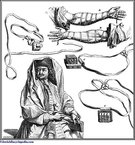 In my recent studies I came across the word phylactery. In the context, Jesus was speaking to the multitudes and His disciples of the scribes’ and Pharisees’ hypocrisy. “They make their phylacteries broad and enlarge the borders of their garments” (Matthew 23:5). I had come across this word in my reading of the scripture before, but admittedly did not know the meaning of the term.
In my recent studies I came across the word phylactery. In the context, Jesus was speaking to the multitudes and His disciples of the scribes’ and Pharisees’ hypocrisy. “They make their phylacteries broad and enlarge the borders of their garments” (Matthew 23:5). I had come across this word in my reading of the scripture before, but admittedly did not know the meaning of the term.
The word phylactery is translated from the Greek word phulaktērion, meaning a guard case or frontlet. The Israelites were told to remember how the Lord had delivered them from Egyptian bondage, and to remember and keep His commandments. “You shall bind them (commandments) as a sign on your hand, and they shall be as frontlets between your eyes” (Deuteronomy 6:8; cf. Exodus 13:1-16; Deuteronomy 11:13-21). The Bible does not indicate that the command to bind God’s words on the “hand” or “between the eyes” was literal. Regardless, at some point the Israelites developed a literal observation as a custom. W. E. Vines describes it as “a small strip of parchment, with portions of the Law written on it; it was fastened by a leather strap either to the forehead or to the left arm over against the heart, to remind the wearer of the duty of keeping the commandments of God in the head and in the heart.”
While Jesus does not condemn the literal observation of the command in Matthew 23, He does condemn the hypocrisy that was associated with it. The scribes and Pharisees were not wearing phylacteries as an aid for remembering God’s commands, rather, “all their works they do (were doing) to be seen by men” (Matthew 23:5).
Today we don’t see people walking around with leather straps fastened to their forehead or arm. However, we see other forms of phylacteries. There are bumper stickers, paintings, tattoos, jewelry, decorations, etc. Most would say this is a testament of their devotion to the Lord, but do they really have the commandments of the Lord in their heart (cf. Deuteronomy 6:4-6)? We need to understand what it means to “Love the Lord your God with all your heart, with all your soul, and with all your strength” (Deuteronomy 6:5). Our love for God is not shown by writing scripture on our bodies with permanent ink, wearing a cross around our necks, or drawing a picture. Our love is shown through obedience. We won’t be judged in the end by whether or not we wore a phylactery. Jesus said, “If you love Me, keep My commandments” (John 14:15).
